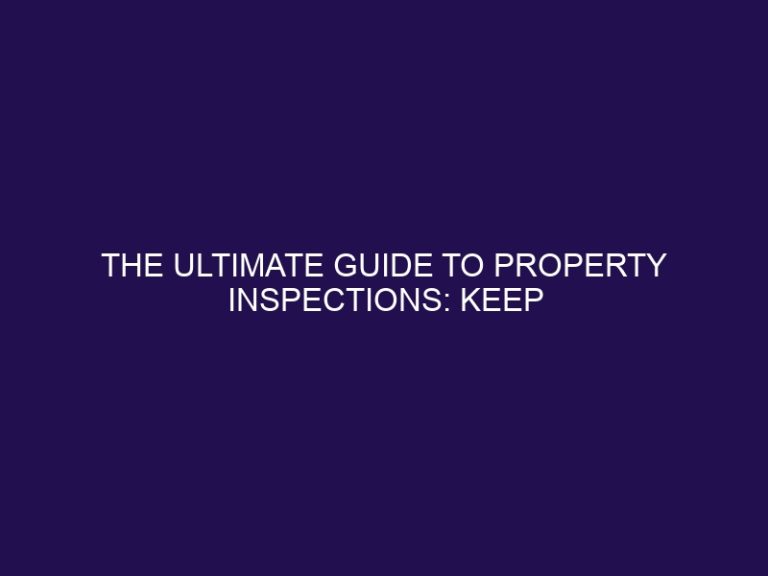How Are Improvements and Repairs Deducted on Your Taxes?
Home improvements and repairs are necessary investments for maintaining and increasing the value of your home. But did you know that these expenses can also provide potential tax deductions? Understanding the difference between home improvements and repairs, and the requirements and restrictions for deducting these expenses on your taxes, can save you money in the long run.
Home improvements refer to renovations and additions that increase the value of your home, while repairs are necessary fixes to maintain your home’s condition. According to the IRS, home improvements can add value to your home, while repairs simply maintain its value.
So, you may wonder if you can deduct these expenses on your taxes. The answer is yes, but it depends on the type of expense. Home improvements may be deductible if they meet certain requirements, such as being considered a “tax benefit property” or being classified as a medical or energy-saving improvement. On the other hand, home repairs are typically not deductible unless they are related to a rental property or home office.
There are limitations and restrictions for deducting home improvements and repairs. For example, the full cost of improvements cannot be deducted in one year, but rather must be depreciated over several years. Additionally, there are exceptions to deducting these expenses, such as if they were covered by insurance or reimbursed by someone else.
To claim deductions for home improvements and repairs, you will need documentation such as receipts, invoices, and proof of payment. The process for claiming deductions involves itemizing your expenses on your tax return and providing proper documentation.
In conclusion, improvements and repairs on your home not only add value and maintain its condition but can also provide tax benefits. Understanding the differences, requirements, and restrictions for deducting these expenses can save you money and help you maximize your tax return.
Key Takeaways:
Understanding Home Improvements and Repairs
Home improvements and repairs are essential for maintaining and increasing the value of a property. It is important to understand the difference between the two, as it can also have an impact on tax deductions. Prioritizing energy-efficient improvements can also lead to tax benefits. It is crucial to keep detailed records of all improvements and repairs to substantiate deductions. Seeking guidance from a tax professional is recommended for tailored advice based on your individual situation.
What is the Difference Between Home Improvements and Repairs?
Home improvements are a great way to enhance the value of a property, while repairs are necessary to restore its original condition. Improvements, such as adding a new room, can significantly increase a home’s worth, while repairs are meant to fix existing components, such as a leaky roof.
Here’s a true story: A friend of mine mistakenly claimed repairs as improvements, resulting in tax deduction errors.
How do Home Improvements Add Value to Your Home?
- How do Home Improvements Add Value to Your Home?
- Enhanced Functionality: Upgrades in kitchens, bathrooms, or energy-efficient systems can greatly increase the value of your home.
- Curb Appeal: Landscaping, exterior painting, and a modernized front entry can make your home more attractive to potential buyers.
- Increased Home Value: Renovations in high-demand areas like bedrooms and bathrooms can significantly increase the overall value of your home.
- Energy Efficiency: Installing solar panels, insulation, or energy-efficient windows can not only save you money on energy bills, but also add value to your home.
How do Home Repairs Maintain Your Home’s Value?
- Prevent Deterioration: Regular repairs safeguard home structure and components, preserving the property’s value.
- Enhance Curb Appeal: Addressing repairs promptly maintains the home’s external aesthetics, contributing to its overall value.
- Safeguard Functionality: Keeping systems and fixtures in good condition ensures the home retains its functionality and worth.
How do Home Repairs Maintain Your Home’s Value?
What Are the Tax Deductions for Home Improvements and Repairs?
When it comes to tax deductions for home improvements and repairs, it is important to have a clear understanding of the eligibility criteria and the specific deductions that are allowed. These deductions may vary depending on the nature of the improvement or repair, so it is recommended to consult with a tax professional for accurate guidance.
A couple recently renovated their kitchen, and thanks to the energy-efficient upgrades they made, they were able to qualify for tax credits, resulting in significant savings.
Can You Deduct Home Improvements on Your Taxes?
Yes, you may be able to deduct home improvements on your taxes if they qualify as medical expenses for accessibility or energy-efficiency purposes. It is important to always keep detailed receipts and documentation to support your claim. Consider seeking guidance from a tax professional for accurate advice on deducting home improvements on your taxes.
Can You Deduct Home Repairs on Your Taxes?
Yes, you may be able to deduct home repairs on your taxes if they qualify as business expenses or if they help maintain the value of your home. However, it is important to seek guidance from a tax professional to confirm eligibility and adhere to IRS regulations.
What are the Requirements for Deducting Home Improvements and Repairs?
To be eligible for deducting home improvements and repairs, it is important to meet the criteria set by the IRS. This includes using the property as your primary residence and ensuring that the improvement adds value or extends the life of the home. Repairs must also be deemed necessary and ordinary for the maintenance of the property. It is crucial to have proper documentation and adhere to all tax laws in order to claim these deductions.
What are the Limitations and Restrictions for Deducting Home Improvements and Repairs?
When thinking about tax deductions for home improvements and repairs, it is essential to have a clear understanding of the limitations and restrictions that apply. The IRS has specific guidelines in place, such as differentiating between repairs and improvements, and ensuring that the expenses do not surpass the increase in property value.
Can You Deduct the Full Cost of Home Improvements and Repairs?
Unfortunately, it is not possible to deduct the full cost of home improvements and repairs on your taxes. However, there may be opportunities for tax credits or deductions based on certain home-related expenses, such as energy-efficient upgrades. For accurate information, it is best to consult a tax professional.
What are the Exceptions to Deducting Home Improvements and Repairs?
Exceptions to deducting home improvements and repairs include situations where the improvements are classified as routine repairs or maintenance, rather than adding value. Furthermore, deductions may be restricted if the improvement does not meet the criteria for capital improvements established by the IRS.
How to Claim Deductions for Home Improvements and Repairs?
- Keep detailed records of all home improvement and repair expenses.
- Know which expenses qualify for tax deductions.
- Utilize IRS Form 5695 for residential energy credits.
Pro-tip: Consult a tax professional for specific advice on how to claim deductions for home improvements and repairs.
What Documentation Do You Need to Claim Deductions?
Ensure you have receipts, invoices, and contracts for the materials and labor used for home improvements and repairs. Additionally, keep records of any permits obtained and inspection reports. This documentation is crucial for claiming deductions on your taxes, so it is important to have it all organized and readily available.
What is the Process for Claiming Deductions on Your Taxes?
- Gather Documentation: Collect all necessary paperwork, including receipts, invoices, and any other relevant documents, for the home improvements and repairs.
- Consult Tax Regulations: Familiarize yourself with the specific tax laws and regulations regarding deductions for home improvements and repairs.
- Complete Tax Forms: Fill out all required tax forms accurately and include all necessary information related to the improvements and repairs.
- Claim Deductions: Clearly state the deductions for home improvements and repairs when filing your tax return.
Frequently Asked Questions
What is the difference between improvements and repairs for tax purposes?
Improvements and repairs are both tax deductible for investment properties, but they are handled differently. Improvements add value to the property and are depreciated over time, while repairs are necessary maintenance and can be deducted in the year they are paid for.
Can I deduct the cost of a cash out refinance as a capital improvement?
No, a cash out refinance is not considered a capital improvement for tax purposes. It is a form of borrowing that increases your mortgage balance and does not add value to the property.
Are changing oil and other routine maintenance considered repairs or improvements?
Routine maintenance such as changing oil or replacing filters is considered a repair and can be deducted in the year it is paid for. These tasks do not add significant value to the property.
Can I deduct the cost of repairs for home systems, such as HVAC or plumbing?
Yes, maintenance and repairs for home systems are deductible in the year they are paid for as long as it is not considered an improvement. Improvements to these systems that add value or extend the useful life of the property must be depreciated over time.
What are energy-related tax credits and how can they affect my tax liability?
Energy-related tax credits are incentives provided by the government for making energy-efficient improvements to a property. These credits can lower your tax burden and may be available for improvements such as solar panels or energy-efficient windows.
Do I need to keep careful track of all improvements and repairs made to my rental property?
Yes, it is important to carefully track all improvements and repairs made to the property in order to accurately claim deductions on your taxes. Keeping detailed records and receipts can help in calculating deductions and avoiding any potential issues with the IRS.







